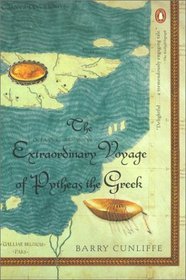Whoa! And I thought I'd done some traveling.
Actually, traveling 2300+ years ago was bit more difficult than it is today. Unless, hundreds of flights are canceled and you're stranded with your family half-way across the country from home and your kids are tired and getting antsy. Fortunately, Pytheas the Greek made the wise decision not to travel with his kids, if he had any.
But what made it infinitely more interesting is that he couldn't book his cruises at a travel agency, because even the travel agents had never been where he was going or even heard of some of those places. What made it even worse is that after he spent so much time traveling to places no one from the Mediterranean had ever been to before, and after he came back and wrote of his travels, he was called a liar by people who had their own travel books to write and needed to promote theirs as best sellers. This sort of thing continued until even the 18th and 19th centuries.
But it was a fascinating account of his travels and I learned a few interesting things myself which upset some history I thought I knew. For example:
Early explorers circumnavigated Africa well over a thousand years before the early Portuguese navigators even thought of themselves as "Portuguese." (page 37)
The word "electricity" was derived from the Greek word "electrum", which was the name of amber. As amber has electrostatic properties. (page 142)
I used to poh-poh the idea monks traveled to Iceland in skinboats. No way! Then I discovered in this book these skin boats were often 15-20 feet long or longer, covered with tanned skins, waterproofed with tar and other substances and could carry up to 20 people, food and trade goods, but were light enough to be carried by two men when empty. Think of a much larger kayak without an entertainment deck, shopping mall or water slides.
Actually, traveling 2300+ years ago was bit more difficult than it is today. Unless, hundreds of flights are canceled and you're stranded with your family half-way across the country from home and your kids are tired and getting antsy. Fortunately, Pytheas the Greek made the wise decision not to travel with his kids, if he had any.
But what made it infinitely more interesting is that he couldn't book his cruises at a travel agency, because even the travel agents had never been where he was going or even heard of some of those places. What made it even worse is that after he spent so much time traveling to places no one from the Mediterranean had ever been to before, and after he came back and wrote of his travels, he was called a liar by people who had their own travel books to write and needed to promote theirs as best sellers. This sort of thing continued until even the 18th and 19th centuries.
But it was a fascinating account of his travels and I learned a few interesting things myself which upset some history I thought I knew. For example:
Early explorers circumnavigated Africa well over a thousand years before the early Portuguese navigators even thought of themselves as "Portuguese." (page 37)
The word "electricity" was derived from the Greek word "electrum", which was the name of amber. As amber has electrostatic properties. (page 142)
I used to poh-poh the idea monks traveled to Iceland in skinboats. No way! Then I discovered in this book these skin boats were often 15-20 feet long or longer, covered with tanned skins, waterproofed with tar and other substances and could carry up to 20 people, food and trade goods, but were light enough to be carried by two men when empty. Think of a much larger kayak without an entertainment deck, shopping mall or water slides.




![header=[] body=[Get a free book credit right now by joining the club and listing 5 books you have and are willing to share with other members!] Help icon](/images/question.gif?v=90afaeb39)
